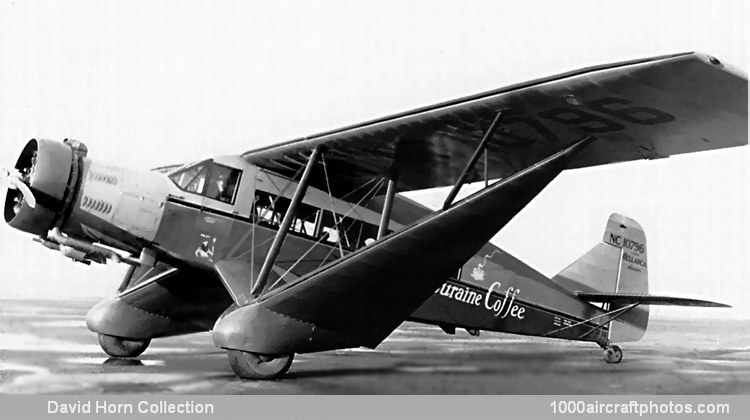10/31/2011. Remarks by Johan Visschedijk: "Giuseppe M. Bellanca's "lifting strut" philosophy reached its evolutionary zenith in the Airbus, a unique design perhaps best described as a cross between strut-braced biplane and sesquiplane. Derived from a 1928 design (the Model K), it flew for the first time in May 1930 and was certificated only three months later.
In its original P-100 form the Airbus could accommodate 11-13 passengers in addition to the pilot, and with 65% full fuel could carry a 3,000 lb (1,361 kg) payload - almost one-third of its maximum take off gross weight - on the power of only a single 600 hp Curtiss GV-1570 Conqueror twelve-cylinder liquid-cooled V-engine. The P-100 successfully demonstrated direct operating costs of only eight cents per mile, but its price of $38,500 was too high to attract buyers, who were also not over-keen on the choice of power plant.
The P-100 was accordingly converted to the much more acceptable (and suitable) 575 hp Wright R-1820-E Cyclone radial, and in this form, designated P-200, it gained certification as a twelve-passenger transport on January 26, 1931; a fifteen-passenger P-300 model was available optionally. However, only three more civil examples were built, including one twin-float P-200A which was operated for some time by New York & Suburban Airlines.
Four P-200 Airbus with 550 hp Pratt & Whitney R-1860-5 Hornets were built for the USAAC as Y1C-27 transports, while ten P-300 Airbus with 650 hp Pratt & Whitney R-1860-19 Hornets were built as C-27A transports.
In 1935, NC10796 was converted to the sole 10-15 passenger Model 66-67 Aircruser, fitted with a 675 hp Wright SR-1820 Cyclone."
